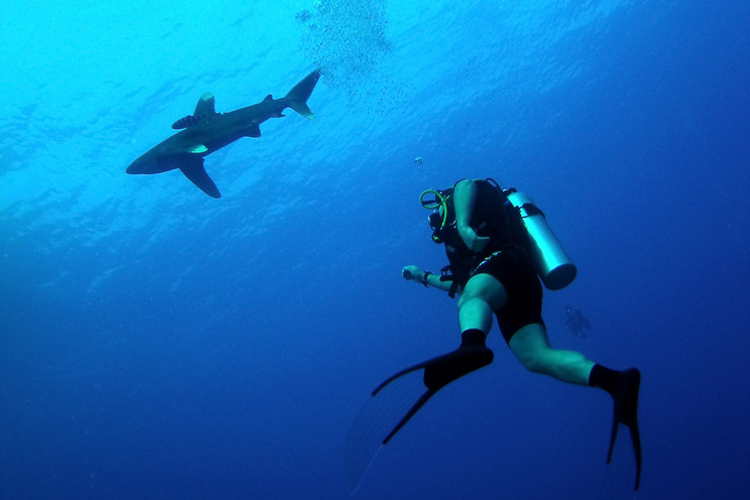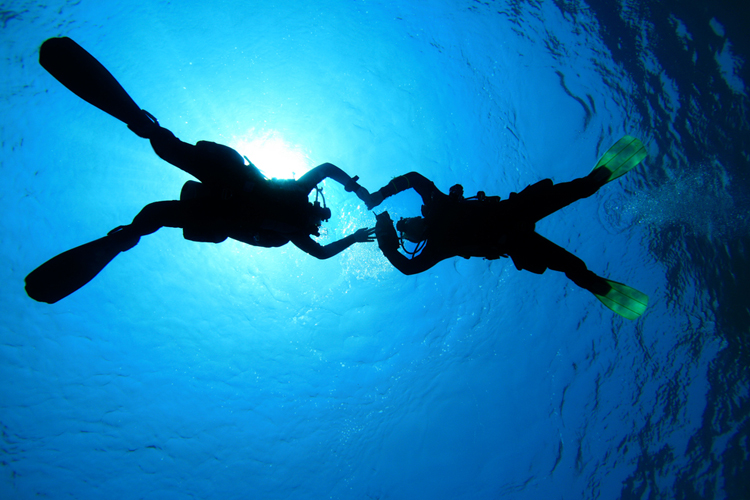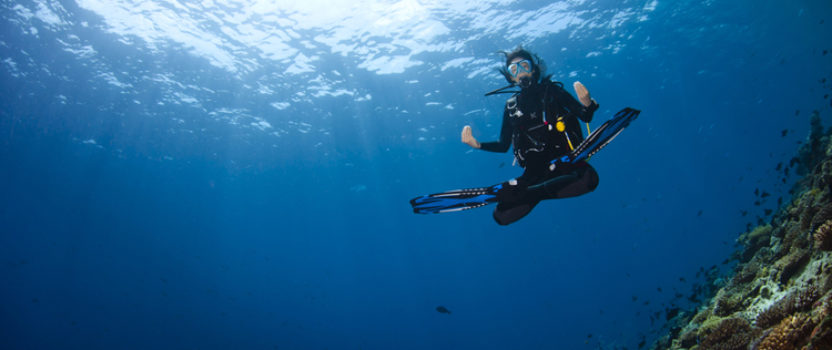Zen and the Art of Diving
The chances are that you or someone you know has been stressed out on a dive. It can be triggered by any numbers of things, such as tough conditions or extreme depth. Charlotte Boan asks a panel of diving experts what is stress, its causes and how to avoid it.
ASKING THE EXPERTS
WHAT ARE THE COMMON CAUSES OF DIVING STRESS?
Richard Bull, experienced technical diver: Diving stress can be divided into two categories: physical and psychological. One can lead to the other and they can feed off each other. A suit too tight, hands too cold, equipment not comfortable – these are all physical stresses. Peer pressure, fear of the unknown, pressure to kit-up too quickly – these are all psychological stresses. If your skills are not up to scratch, you may encounter situations with which you will be unable to cope. That is a psychological stress, which in turn will almost certainly ensure that you won’t be able to cope with those situations. No diver should put himself in a situation that causes extreme stress – these situations will be different for experienced divers and new divers.
Dr. Rachel Broadley, hyperbaric physician: Stress is often precipitated by a single event and is difficult to predict because an individual’s response will vary as the situation changes. A stressful situation of any cause, if not dealt with, can lead to a state of panic, which is very dangerous underwater. The reaction of an individual will be highly variable and dependent on a diver’s training, experience, personality and physical ability. If a diver is in good health, has had appropriate training and experience for the diving conditions involved and there has been thorough preparation and dive planning, stress and panic is very unlikely.
Clare Peddie, BSAC national diving officer: Stress underwater can develop from lack of confidence in your own ability, your buddy’s ability, your equipment or your surface support. Panic does seem to affect trainees more often, but occasionally divers who think they are experienced will slip out of their comfort zone and suddenly find themselves in situations which are out of their control.
HOW DO YOU RECOGNISE SIGNS OF EXTREME STRESS IN YOURSELF?
Bull: With difficulty – it’s only through experience that you will know that you are heading in that direction. The more stressed you are, the more your perception of the situation narrows and becomes distorted. It is better to recognise that stress is deepening and nip it in the bud before it becomes extreme.
Broadley: It is important to realise that these symptoms may start before getting into the water and issues that cause anxiety may need to be addressed pre-dive to avoid a dangerous situation at depth. Behavioural changes before and during the dive may signal signs of anxiety. Some relieve tension through humour, while others may fall silent when they are anxious. Signs of agitation may lead to irregular, erratic motions. Divers are usually orientated towards their buddy and towards the bottom, focused on what they are observing; the anxious diver is often focused on the surface.
Peddie: I’m a pretty laid-back diver – it takes a lot to stress me out when I’m in the water. In the run-up to a dive, however, poor marshalling and management of the dive plan can stress me. I usually keep it to myself when things are gong badly, however, if I think safety is becoming jeopardised I will point this out to the dive marshal.
DOES KEEPING FIT HELP REDUCE STRESS LEVELS UNDERWATER?
Broadley: An individual’s physical condition is very influential in the development and progression of panic underwater. Recreational diving requires a good level of general fitness (particularly cardiovascular) and stamina. Fatigue can be a serious issue in the underwater environment, with additional factors such as fitness and cold exacerbating the problem. However, this is not to say that individuals with a physical disability should be excluded from diving.
Bull: An unfit person is much more likely to suffer from the physical stresses that lead to psychological stress and to panic.
Peddie: I agree. A panic situation could certainly develop more quickly in a diver who is struggling to cope in a physically demanding situation.
WHY DOES DEPTH MAKE SOME DIVERS NERVOUS?
Bull: If you are not comfortable at depth, you will suffer psychological stress. Imagine you are diving off Brixham Breakwater in Devon in 3m of water and that you are performing some very basic skills such as mask clearing. But what if you were a few miles offshore performing the same tasks at 50m on the wreck of the Rota? Same sea, same mask and the same skill, but a very different stress level and far more chance of a diver panicking.
Peddie: In response to a dive in which the stress levels start to rise, the diver may start to hyperventilate which causes a build-up of carbon dioxide. This then causes the consequent problem of nitrogen narcosis and a downward spiral of physiological responses that may well bring on a full panic attack.
Broadley: Physical factors that may occur at depth and lead to panic include cold, fatigue, inert gas narcosis, limited breathing-gas supply, decompression schedules and sensory deprivation.
HOW CAN YOU COMBAT NITROGEN NARCOSIS AND REDUCE STRESS LEVELS AT DEPTH?
Bull: Narcosis is a fact of life when diving on air. However, you can learn to live with it. Build up to deeper dives and never forget that both you and your buddy will be affected. This will minimise the number of rash decisions and exotic plans you make at depth. Or you could always learn to dive on helium mixes.
Broadley: Although there is a high individual variation to nitrogen narcosis, no one is immune. Several studies have been carried out to examine whether repeated exposure to diving reduces the amount of narcosis experienced. Overall there does not appear to be any improvement in performance in subsequent dives that could be attributed to an increased ‘tolerance’ to nitrogen.
Peddie: Recognise the symptoms and ascend to alleviate the problem if you have to. I try to avoid nitrogen narcosis whenever I can, especially since I began using a closed-circuit rebreather. I find that I need to be fully in control of my thoughts, so below 40m I will use trimix.
WHAT SHOULD YOU DO WHEN LOW VISIBILITY MAKES YOU ANXIOUS?
Bull: Try to avoid it, is the short answer. This may mean refusing to dive or aborting the dive. If you are determined to dive, make sure that the conditions are not a surprise by visualising the dive and the lack of visibility beforehand.
Broadley: The diver has to accept the visual changes underwater such as the underestimation of distances underwater, the visual field being limited by masks, mask fogging and the possible effects of narcosis. In low viz, divers should dive with experienced buddies who are used to the conditions and should dive following training guidelines, such as using buddy lines when appropriate.
Peddie: Low visibility is something that has never worried me as long as it has been planned for. A distance line from the shot is a fantastic tool to reassure divers of the way back. Low visibility is often diver generated and is worse around the shot area. I find that a torch in extremely low visibility is often useless because of backscatter, so I sometimes close eyes briefly to relax. It seems far less stressful closing your eyes than trying to see – it also allows me to use my other senses.
HOW SHOULD YOU DEAL WITH SUDDEN CHANGE?
Peddie: It’s more likely that the diver hasn’t realised that the conditions have started to change because of lack of awareness. Divers should be constantly assessing the dive for change and adjusting the plan accordingly, and should abort the dive if the change is extreme.
Bull: If you are caught out by something such as poor visibility, try to maintain contact with your buddy by holding hands with them. A bit of human contact works wonders in the majority of situations. Breathe deeply, exhale completely – this will make you less anxious and more able to make rational decisions.
WHAT SHOULD YOU DO IF YOU FEEL YOU’VE BEEN PRESSURED INTO A DIVE?
Bull: It’s simple – just don’t dive. You would start the dive feeling stressed. What worse situation could you imagine than it all going wrong on the bottom while you are thinking ‘I didn’t want to do this’? I’d also think twice about going on any more dive trips with those who have tried to pressure you into dives.
Peddie: I’m not prepared to be forced into a dive. Friends who know me well know that I only dive when I’m personally happy to do so. I have a responsibility, not only to myself, but also to my family to return from a dive. There will always be another opportunity to dive, but there is only one opportunity to live.
WHAT ABOUT TASK-LOADING AND STRESS?
Peddie: A good dive marshal would never overload a buddy pair with tasks and would understand what can be realistically achieved. When performing a task underwater it is easy to get preoccupied with the task, which compromises safety. It is important to prioritise when completing tasks and be prepared to abandon them to concentrate on dive safety.
Bull: If it causes stress, speak up. It’s up to you to let those around you know that it’s getting too much. It’s your life!
HOW SHOULD YOU DEAL WITH EQUIPMENT FAILURE?
Bull: Calmly. But be angry with yourself afterwards because 99.9 per cent of equipment failures are preventable! I have worked as a diver for more than 25 years and I can count on one hand the number of genuine, unpreventable equipment failures that I have witnessed.
Peddie: The most important thing is to avoid the situation in the first place through regular maintenance. All training agencies cover responses to major equipment failure, such as air supply problems, through repetitive training. In a minor equipment failure, such as that of a torch or reel, you need to make a considered decision whether it is safe to continue. It depends on which piece of equipment and its importance to the dive.
WHAT IF ENCOUNTERS WITH CERTAIN MARINE ENCOUNTERS MAKE YOU NERVOUS?
Bull: Try to find out the real facts about an animal’s behaviour. Two things are certain: firstly that almost all creatures described as man-eaters are nothing of the sort, and secondly nearly all aggressive behaviour by animals is in self-defence. Many people are nervous around conger eels, despite them being one of the most timid creatures in the ocean. If you are not convinced about certain animals, avoid them. However, on a recent trip to film 2m-long Humbolt squid that have beaks the size of teacups, I did have to re-evaluate my own advice!

WHAT WILL PRE-DIVE MEASURES HELP AVOID PANIC AND HIGH LEVELS OF STRESS?
Bull: Kit-up in plenty of time. Do some breathing exercises, then visualise the dive four times. First, visualise all aspects of the dive, from getting into the water, descending, ascending and exiting. Do this again, but this time visualising all the things that can go wrong.
Broadley: Honest declaration of issues which cause anxiety before the dive means they can be addressed so the onset of stress and that panic is minimised.
IF YOU PLAN TO FURTHER YOUR TRAINING, SUCH AS DEEPER DIVING OR MORE INVOLVED WRECK DIVING, HOW SHOULD YOU DEAL WITH PRE-COURSE NERVES?
Peddie: Preparation is everything for me. I really like to know what I’m letting myself in for and I like to do some reading around the subject beforehand. I also like to speak to the instructor and talk to them about my apprehensions and feelings prior to the course. Apparently when I first set foot on board the MV Maureen on my first national instructor course, I said: ‘Hi, my name is Clare, and I really don’t know why I have just driven ten hours to be here – I’m not ready!’ I can’t remember this, but the instructors assure me this is true!
WHAT HELP IS AVAILABLE TO ANXIOUS DIVERS WHO DON’T WANT TO GIVE UP DIVING?
Broadley: Training programmes which develop skills and self-confidence may help an individual to overcome anxiety in specific aspects of diving. It is important to maintain communication with the dive instructor, guide or buddy if there are ongoing concerns. The idea is to address anxiety-related issues pre-dive to minimise the potential for serious problems to develop underwater
Peddie: In BSAC branches the training and support doesn’t stop at the end of your course, and there are more experienced members in the branch to help you through. There is always the opportunity to step back a stage in training and re-establish your comfort zones.
Bull: Perhaps the best way forward is to have some really pleasant diving experiences – shallow, warm, clear water with lots to see.
TOP 10 TIPS: BEATING STRESS
1 Practise skills under stressful and task-loaded conditions in a benign environment.
2 Always make sure you dive within your own comfort zone. Only you really know its limits.
3 Thoroughly prepare for every dive and thoroughly plan every one of your dives.
4 Deal with small problems as they arise to prevent lots of small problems becoming one big one.
5 Test out only one item of new equipment at a time. No extreme dives with unfamiliar kit.
6 Don’t dive if it doesn’t feel right. Nervous excitement is not to be confused with real concern.
7 Dive with a skilled buddy when extending your personal experience.
8 If you get a problem underwater remember – stop… breathe… think… act.
9 Be fit to dive. Both physically and mentally – particularly after a longish lay-off.
10 No diving with hangovers! Don’t let a Saturday night binge ruin the dives

HOW TO HELP A PANICKING BUDDY
You need to help reduce the level of stress and bring your buddy back from the brink of panic.
Put one hand on their shoulder
Establish good eye contact
Signal for them to stop and breath deeply
Often, a reassuring squeeze of the hand that lets your buddy know you’re there for them is enough to calm them down
MEET THE PANEL
Technical diving aficionado Richard Bull has worked underwater for more than 25 years. His many diving qualifications include BSAC first class diver, IANTD and TDI instructor and Norwegian commercial diver. He works as a freelance diving consultant for film and television.
BSAC’s newly appointed national diving officer, Clare Peddie, is a highly active instructor trainer, expedition leader and branch diver. She learned to dive 16 years ago and has since qualified as a BSAC national instructor, TDI trimix instructor and Dräger and Inspiration rebreather diver.
Hyperbaric physician at the Diving Diseases Research Centre, Dr Rachel Broadley, treats and studies diving-related illness. Oxygen toxity and carbon monoxide poisoning are her main areas of interest.
Written by Charlotte Boan, writer for divemagazine.co.uk



Leave a Reply
Your email is safe with us.